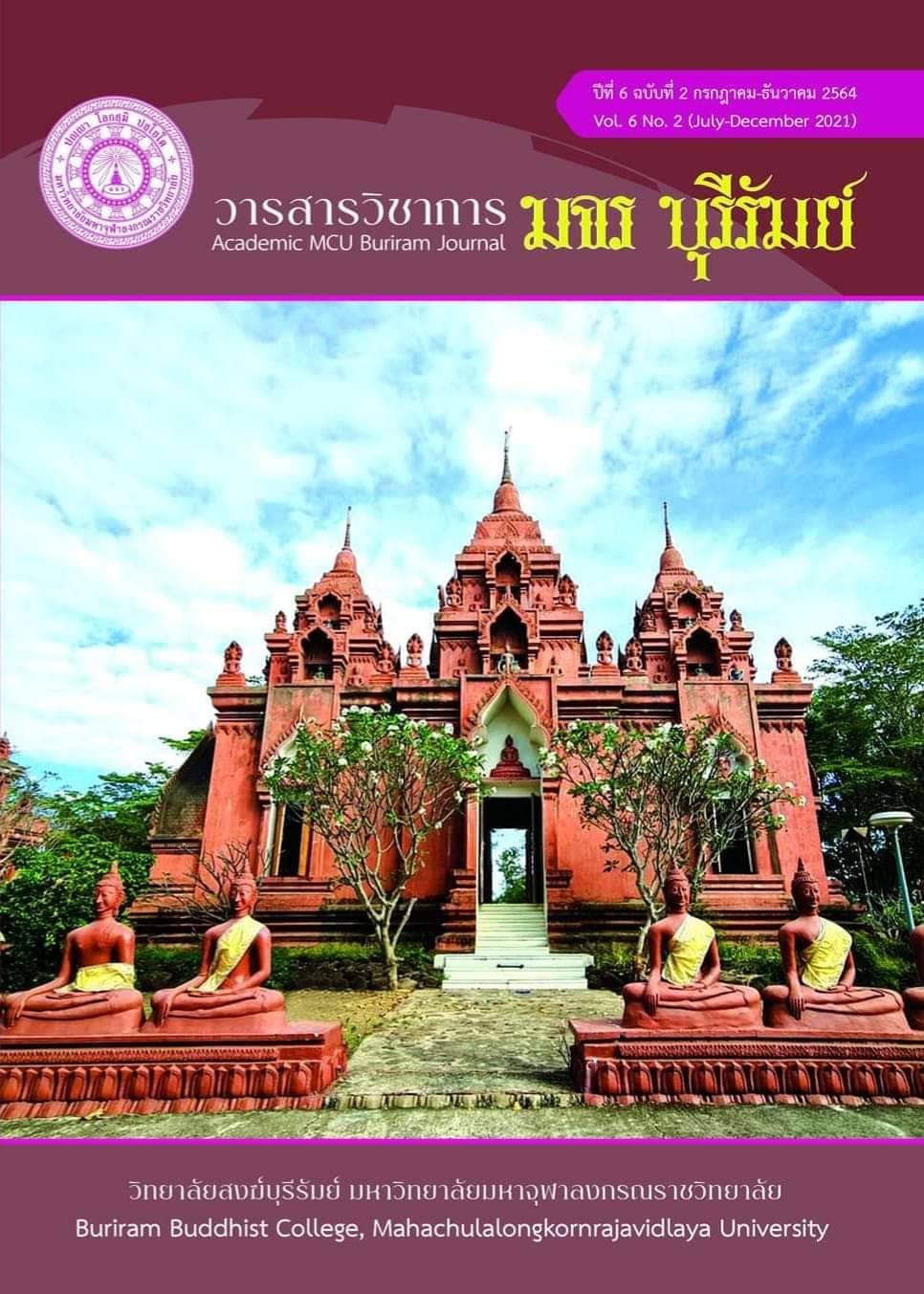People's Behavior in Election of Members of The House of Representatives B.E. in Nakhon Ratchasima Constituency 5
Keywords:
Behavioral Election, Member of the House of RepresentativesAbstract
The objectives of this research were: 1) to study the level of behavior of the people in the 2019 election of members of the House of Representatives in the fifth constituency, Nakhon Ratchasima Province; 2) to study the level of behavior of the people in accordance with the Seven Aparihāniyadhamma (Things leading never to decline but only to prosperity) in the aforesaid election; 3)to study the relation between personal factors, the Seven Aparihāniyadhamma and people's behavior in the election mentioned; 4) to study recommendations on behavior of the people in the elections as mentioned above. The samples used in the study consisted of 400 participants by calculated the form Taro Yamane. The interviews were conducted with 8 key informants. The tools for data collection were questionnaires and interviews. The obtained data were analyzed by using a social science computer program and the content was analyzed by a descriptive approach.
The research result finds that:
1. The behavior of the people in the 2019 elections of members of the House of Representatives in the fifth constituency, Nakhon Ratchasima Province was statistically rated at a high level in overall.
2. The behavior of the people in accordance with the Seven Aparihāniyadhamma in the election of members of the House of Representatives in the fifth constituency, Nakhon Ratchasima Province was statistically rated at a high level in overall.
3. The relationship between personal factors, the Seven Aparihāniyadhamma and people's behavior in the election mentioned indicates that people with differences in age, marriage status and the Seven Aparihāniyadhamma had the relation with the statistical significance level of 0.05. For those with differences in gender, education, occupation and monthly income, there was no relation.
4. The recommendations on behavior of the people in the elections are that in terms of use of voting rights, people should use their right to vote in a transparent manner; in terms of polling, people should vote in elections with righteousness, objectivity, and common interests; is regards to timing of election decisions, people should be thoroughly informed of the information of the candidates; for the Seven Aparihāniyadhamma, people should have unity, promote and support together to use the right to vote according to the Seven Aparihāniyadhamma.
References
กาญจนา พันธุ์เอี่ยม และคณะ. (2556). ทัศนคติและพฤติกรรมการใช้สิทธิ์เลือกตั้งสมาชิกสภาผู้แทนราษฎรของผู้นำชุมชนเทศบาลเมืองหัวหิน จังหวัดประจวบคีรีขันธ์”. รายงานการวิจัย. สนับสนุนงบประมาณโดยมหาวิทยาลัยเทคโนโลยีราชมงคลรัตนโกสินทร์.
เกียรติกร พากเพียรศิลป์ และคณะ. (2552). ปัจจัยที่มีผลต่อการตัดสินใจลงคะแนนเสียงเลือกตั้ง สมาชิกสภาผู้แทนราษฎร: กรณีศึกษาการเลือกตั้งสมาชิกสภาผู้แทนราษฎรจังหวัด ปราจีนบุรี. สารนิพนธ์รัฐศาสตรมหาบัณฑิต (สื่อสารการเมือง). วิทยาลัยสื่อสารการเมือง: มหาวิทยาลัยเกริก.
โกวิทย์ พวงงาม และอลงกรณ์ อรรคแสง. (2547). มิติใหม่องค์การปกครองส่วนท้องถิ่น: ผู้บริหารท้องถิ่นที่มาจากการเลือกตั้งโดยตรงจากประชาชน. กรุงเทพมหานคร: สำนักพิมพ์เสมาธรรม.
เฉลิมพล นุชอุดม. (2562). เกณฑ์ในการตัดสินใจเลือกผู้แทนระดับท้องถิ่น ในเขตกรุงเทพมหานคร. วารสารวิชาการมหาวิทยาลัยปทุมธานี, 11(2), 132.
นุชปภาดา ธนวโรดม. (2557). พฤติกรรมการเลือกตั้งของผู้มีสิทธิเลือกตั้งในเขตเทศบาลนครสวรรค์ จังหวัดนครสวรรค์. วิทยานิพนธ์พุทธศาสตรมหาบัณฑิต. บัณฑิตวิทยาลัย: มหาวิทยาลัยมหาจุฬางกรณราชวิทยาลัย.
ประยงค์ พรมมา. (2556). การบริหารงานตามหลักอปริหานิยธรรมขององค์การบริหารส่วนจังหวัดขอนแก่น. วิทยานิพนธ์พุทธศาสตรมหาบัณฑิต. มหาวิทยาลัยมหาจุฬาลงกรณราชวิทยาลัย.
พันธุ์ทิพา อัครธีรนัย. (2559). ปัจจัยที่มีผลต่อการตัดสินใจในการเลือกตั้งสมาชิกสภาผู้แทนราษฎรจังหวัดนครนายก: ศึกษาในช่วงเวลา พ.ศ. 2559. สารนิพนธ์รัฐศาสตรมหาบัณฑิต. วิทยาลัยสื่อสารการเมือง: มหาวิทยาลัยเกริก.
ยงยุทธ พงษ์ศรี. (2562). ปัจจัยที่มีผลต่อการเลือกตั้งสมาชิกสภาผู้แทนราษฎรในจังหวัดปทุมธานี: ศึกษาในห้วงเวลาปี พ.ศ. 2562. สารนิพนธ์รัฐศาสตรมหาบัญฑิต (สื่อสารการเมือง). วิทยาลัยสื่อสารการเมือง: มหาวิทยาลัยเกริก.
ลัดดา งามโสภา. (2553). แนวทางการพัฒนาพฤติกรรมการเลือกตั้งของผู้มีสิทธิเลือกตั้งในเขตอำเภอขาณุวรลักษบุรี จังหวัดกำแพงเพชร. วิทยานิพนธ์ศิลปศาสตรมหาบัณฑิต. บัณฑิตวิทยาลัย: มหาวิทยาลัยราชภัฏกำแพงเพชร.
วิรัช เพียรชอบ. (2552). พฤติกรรมการใช้สิทธิทางการเมืองของผู้มีสิทธิเลือกตั้งในเขตพื้นที่องค์การบริหาร ส่วนตำบลทุ่งควายกิน อำเภอแกลง จังหวัดระยอง. วิทยานิพนธ์ศิลปศาสตรมหาบัณฑิต. บัณฑิตวิทยาลัย: มหาวิทยาลัยราชภัฏรําไพพรรณี.
อนุวัฒน์ ศรีษะเก. (2563). การประยุกต์ใช้หลักอปริหานิยธรรม 7 เพื่อการทำงาน: กรณีศึกษาอำเภอหนองนาคำ จังหวัดขอนแก่น. วารสาร MBUISC Journal, 1(2), 68.
Downloads
Published
How to Cite
Issue
Section
License
ทัศนะและความคิดเห็นที่ปรากฏในบทความวารสารฉบับนี้ถือเป็นความรับผิดชอบของผู้เขียนบทความนั้น ไม่ถือเป็นทัศนะและความรับผิดชอบของบรรณาธิการ





